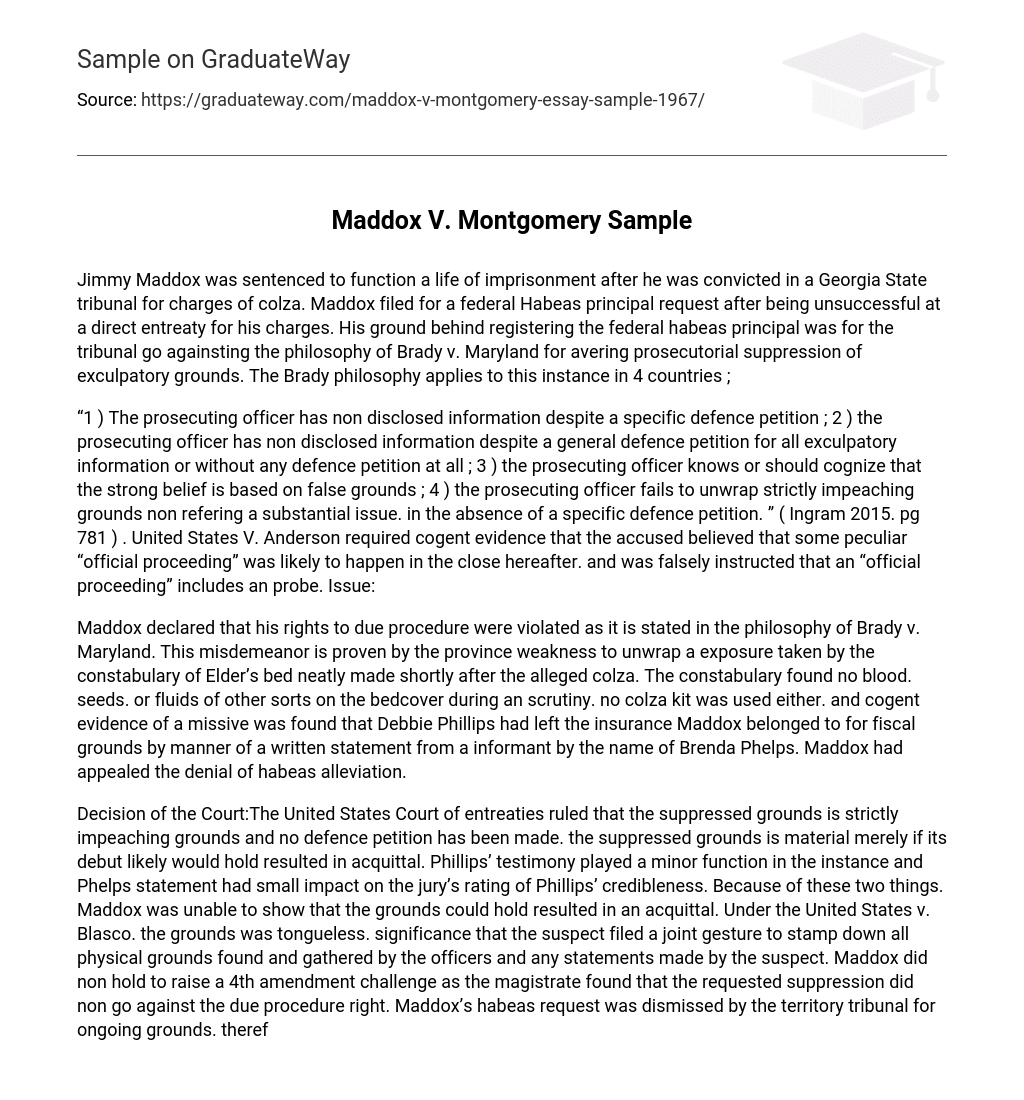Jimmy Maddox was sentenced to function a life of imprisonment after he was convicted in a Georgia State tribunal for charges of colza. Maddox filed for a federal Habeas principal request after being unsuccessful at a direct entreaty for his charges. His ground behind registering the federal habeas principal was for the tribunal go againsting the philosophy of Brady v. Maryland for avering prosecutorial suppression of exculpatory grounds. The Brady philosophy applies to this instance in 4 countries ;
“1 ) The prosecuting officer has non disclosed information despite a specific defence petition ; 2 ) the prosecuting officer has non disclosed information despite a general defence petition for all exculpatory information or without any defence petition at all ; 3 ) the prosecuting officer knows or should cognize that the strong belief is based on false grounds ; 4 ) the prosecuting officer fails to unwrap strictly impeaching grounds non refering a substantial issue. in the absence of a specific defence petition. ” ( Ingram 2015. pg 781 ) . United States V. Anderson required cogent evidence that the accused believed that some peculiar “official proceeding” was likely to happen in the close hereafter. and was falsely instructed that an “official proceeding” includes an probe. Issue:
Maddox declared that his rights to due procedure were violated as it is stated in the philosophy of Brady v. Maryland. This misdemeanor is proven by the province weakness to unwrap a exposure taken by the constabulary of Elder’s bed neatly made shortly after the alleged colza. The constabulary found no blood. seeds. or fluids of other sorts on the bedcover during an scrutiny. no colza kit was used either. and cogent evidence of a missive was found that Debbie Phillips had left the insurance Maddox belonged to for fiscal grounds by manner of a written statement from a informant by the name of Brenda Phelps. Maddox had appealed the denial of habeas alleviation.
Decision of the Court:The United States Court of entreaties ruled that the suppressed grounds is strictly impeaching grounds and no defence petition has been made. the suppressed grounds is material merely if its debut likely would hold resulted in acquittal. Phillips’ testimony played a minor function in the instance and Phelps statement had small impact on the jury’s rating of Phillips’ credibleness. Because of these two things. Maddox was unable to show that the grounds could hold resulted in an acquittal. Under the United States v. Blasco. the grounds was tongueless. significance that the suspect filed a joint gesture to stamp down all physical grounds found and gathered by the officers and any statements made by the suspect. Maddox did non hold to raise a 4th amendment challenge as the magistrate found that the requested suppression did non go against the due procedure right. Maddox’s habeas request was dismissed by the territory tribunal for ongoing grounds. therefore doing this determination by the territory tribunal affirmed. Reasoning of the Court:
The Brady philosophy was determined to non use by the United States Court of Appeals because the defence squad for Maddox had non requested the information be disclosed. Maddox brought up his station strong belief habeas corpus request after he unsuccessfully pursued his direct entreaty. The due procedure was proven to be violated through the omitting of grounds and the failure to unwrap in the United States v. Agurs. The constabulary scrutiny of the bedcover produced consequences that did non give rise to sensible uncertainty and are mute under Agurs. The appellant’s version of the incident is found to be consistent with the information and does non belie the alleged victim’s testimony. The grounds in inquiry for the instance is non sufficiently material to render the state’s failure to unwrap unconstitutional due to the significant inculpative grounds in the record. Rule of Law:
In order to derive triumph on a Brady claim. you have to set up the materiality of the exculpatory information suppressed by the prosecution. United States v. Kopituk. The applicable threshold of materiality. nevertheless. varies depending on the type of state of affairs. Dissent:
All the grounds can non see the regard most inclined to the authorities. but alternatively should measure all the grounds as it pertains to the deliberations of a fact finder.





